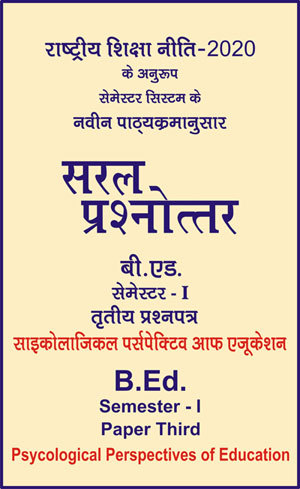|
बी एड - एम एड >> बी.एड. सेमेस्टर-1 प्रश्नपत्र-III - साइकोलाजिकल पर्सपेक्टिव आफ एजूकेशन बी.एड. सेमेस्टर-1 प्रश्नपत्र-III - साइकोलाजिकल पर्सपेक्टिव आफ एजूकेशनसरल प्रश्नोत्तर समूह
|
5 पाठक हैं |
|||||||
बी.एड. सेमेस्टर-1 प्रश्नपत्र-III - साइकोलाजिकल पर्सपेक्टिव आफ एजूकेशन (अंग्रेजी भाषा में)
Question- Describe the relation between Psychology and Learner.
Answer-
Psychology is the soul of education while learner is the core of education. The learner is also termed as educand, which applied to students who individually or collectively participate in educational programmes. These students taken collectively constitute the class. The process of learning means the process of education is advanced in the time when teaching is in progress. The relation between these two, Psychology and Learner, ensures the success of educational process. The teacher always needs to be remember that the hurt of all education is learning and that his/her role is to guide and stimulate pupils. The teacher needs to know the psychological conditions which make for effective learning and must be able to apply these conditions in the classrooms.
Psychology Assistance to Learner
Psychology assists every part and parcel of education process. The learner is also assisted by Psychology to develop positive behaviour and to curtail negative traits, if any. The development of educational tasks under the assistance Psychology are given below in two heads - To Assist in Tasks of Childhood and To Assist of Tasks of Adolescent :
1. To Assist in Tasks of Childhood
- To help in developing physical skills necessary for organizing games.
- In building wholesome attitude towards one self as an integrated growing organism.
- To help in making relation with other are mates.
- In understanding operational masculine or feminine role.
- To develop functional skill as reading, writing and calculating.
- To prepare for day-to-day living.
2. To Assist of Tasks of Adolescent
- To develop new and more mature relation with age mates.
- To prepare for different role taking in and outside family and school.
- To prepare for and adjustment with physical and psychological body changes.
- To prepare for economical independence.
- To prepare for emotional independency.
- To prepare for future family life.
- To inculcate higher intellectual and educational skills.
- To develop maturity to accept individual differences.
The Relation between Psychology and Learner
The above discussion firmly established that Psychology helps learner in each and every field of education. Psychology aims to understand demands of the learner and learner provides necessary data to construct psychological hypothesis. This relation can be observed in the following educational attributes :
-
Rational Power : Education is possible because human can learn. One aim of the Psychology is to develop the rational powers of the child. The plasticity of the learner particularly in early stages of life provide enough width to construct instructional program under psychological guidance.
-
Academic Development : Psychology has continuously made significant contribution to the theory and practice of educational development of learner. From primary education to higher education, psychological principals are employed to set academic objectives and to lead practical ways for their achievement.
-
Methods of Teaching : Modern methods of teaching are made learner friendly with more and more use of psychological laws. The development of the psychology of learning, recently, has furnished a guide for evaluating methods of teaching.
-
Motivation : Psychology provides intensive research material to the development of learner's motivation. It helped teachers to be sensitive to the needs for motivating learner.
-
Problems of Learner : Psychology has made teachers sensitive to the problems of learner concerning personality and environment, both. In other word this Psycho-learner relation has provided tools to teachers to focus their attention on all aspects of the learner's development.
-
Measurement : The development and use of a wide variety of measuring instruments in Psychology have brought into focus individual difference of learner. This has led to increased interests in individualizing the educational programme.
-
Personality Adjustment : Psychological development in personality adjustment has led to a re-evaluation of classroom control and description. Teachers are now more sensitive to the needs and the personal-emotional problems of the leaner. These development have also shown the crucial role constructive interpersonal relationships between teaches and learner in creating good personal adjustment.
|
|||||














